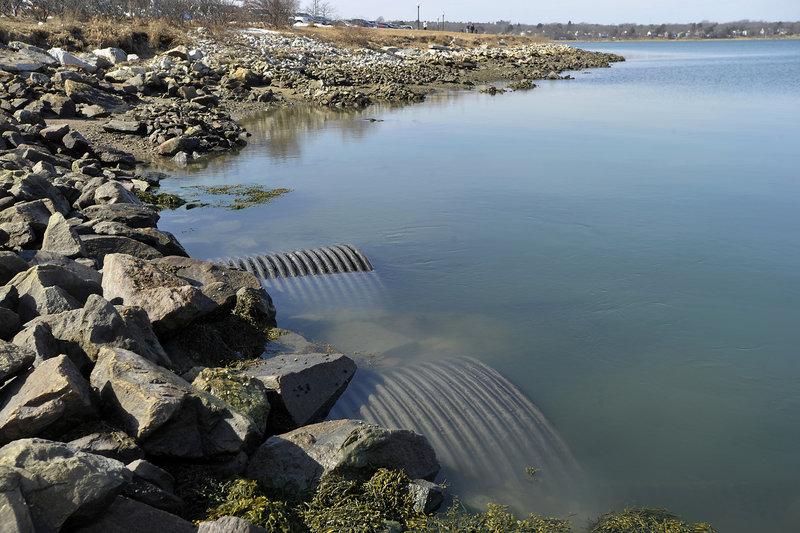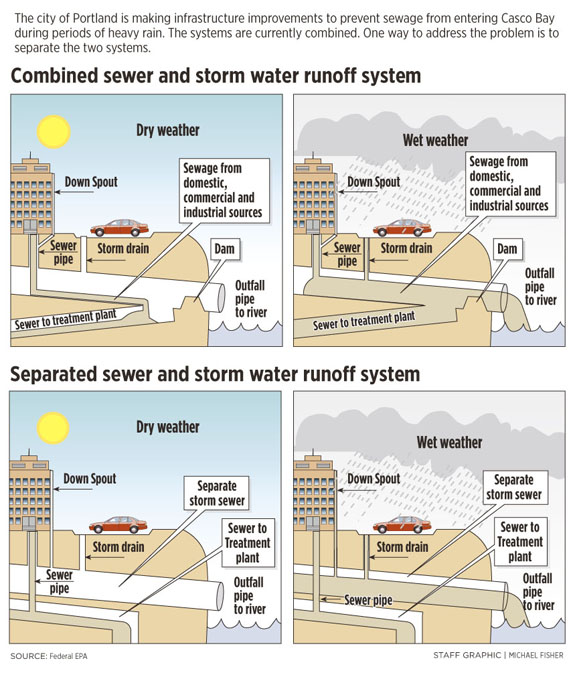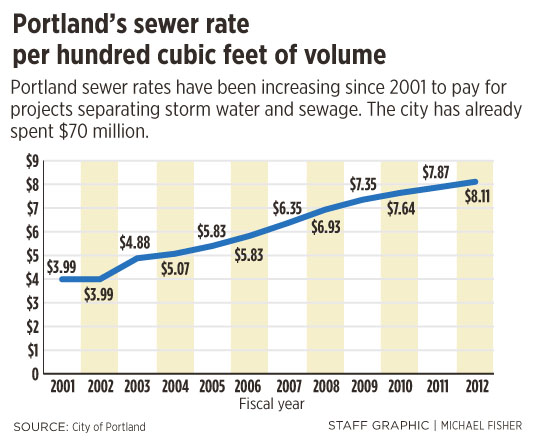PORTLAND – A task force that’s looking for ways to fund a $170 million project to prevent raw sewage from draining into Casco Bay is recommending a bigger burden for owners of properties that create large amounts of stormwater runoff.
The proposal will get its first feedback from the public Monday when the city’s Sustainable Stormwater Funding Task Force hosts its first meeting.
The plan would create winners and losers. The winners would be homeowners, apartment owners and big water users, such as manufacturers. The losers would be property owners who now pay little or nothing in sewer fees but whose properties create lots of runoff, such as parking lots, large stores and warehouses.
To pay for the project with sewer fees alone, the typical homeowner, who now pays $438 a year, would see sharp increases in coming years — 5 percent to 11 percent — and pay three times as much by 2029.
If the City Council adopts the new system, the typical homeowner’s sewer bills will go down slightly, though the amount has not been determined.
Property owners would pay separate fees for the stormwater that runs off their properties. The fees, yet to be determined, would be based on the amount of each property’s impervious surface, such as a roof or pavement.
Sewer fees would cover half the cost of the project, and the new fees would pay the rest.
Portland’s current sewer system works well most of the time. During light rain, the system can handle the sewage and the extra runoff.
But during heavy rainstorms the system overflows, sending sewage, industrial waste and stormwater flowing untreated into streams, rivers and coastal waters. The polluted water carries pathogens that can make swimmers sick and contaminate seafood.
Since 1993, the city has been under a federal order to fix the problem.
To work toward compliance, Portland has been separating its sewer lines from its stormwater drainage system.
Last year, the City Council approved a plan supporting $170 million worth of additional projects to reduce sewer overflow to 87 million gallons a year. The plan is set to begin in 2014.
As part of the $170 million project, the city will likely use a less expensive method — storing stormwater in holding tanks in various sections of the city, then treating it in the wastewater treatment plant.
Last year, the City Council decided that it should finish the project in 15 years rather than 25 years, as originally planned. That timetable also would move up the debt repayments by 10 years, with the annual payment peaking at $20 million in 2029, rather than 2039.
The 18-member task force considered funding the project with property taxes, or with the current system by relying entirely on sewer fees.
Both options have serious drawbacks, said Bill Connolly, a task force member who manages real estate issues for Mercy Hospital.
“If it gets rolled into the tax base, the homeowner will be the biggest loser,” he said. “If it gets rolled into the sewer bill, as it has been all along, it doesn’t hit the right people.”
Forcing sewer users to pay the project’s entire cost would increase bills for manufacturers so much that they might leave the city, said Ian Houseal, the city’s sustainability coordinator.
The task force’s recommendations couldn’t have come at a worse time. The city is being criticized for failing to bill the Shipyard Brewing Co. for as much as $1.5 million in sewer fees from 1996 to 2011. The city has hired an outside attorney to investigate how the error occurred.
The problem raises doubt about the city’s ability to fairly implement a new fee system, said Chris O’Neil, a lobbyist with the Portland Community Chamber of Commerce.
“This coinciding with the erroneous sewer billing of the Shipyard will likely compound the angst among the community,” O’Neil said.
City Councilor Ed Suslovic, who chairs the task force, has been the council’s most vocal critic of the way the city has handled Shipyard’s billing. He said he’s worried that the billing problems will make it harder to establish a new fee system.
That’s why Suslovic wants to create an independent panel to oversee how the proposed fees and current fees are collected and how the money is spent.
“I can see people saying, ‘How dare you impose a new fee when you can’t even run the current system,’” he said.
O’Neil said business people are asking how the city got into the position of needing to spend so much money, why it never was able to get any federal help, and whether any other sources of money are available.
The city has tapped all available state and federal funding, Houseal said, and those funds are limited.
He said the city doesn’t have much choice. The state is requiring the city to comply with the federal Clean Water Act.
Moreover, cleaning up Casco Bay is the right thing to do, he said. The city is responsible for about 98 percent of all the sewer overflow that enters the bay.
“A lot of Portland’s population supports making sure that we are not putting raw sewage into Casco Bay,” he said.
The task force hearing is scheduled for 6:30 p.m. Monday in Room 24 in City Hall.
On April 12, the chamber’s Economic and City Affairs Committee and the Maine Real Estate and Development Association will hold a breakfast meeting on the issue at the Holiday Inn by the Bay.
Staff Writer Tom Bell can be contacted at 791-6369 or at:
tbell@mainetoday.
Send questions/comments to the editors.





Success. Please wait for the page to reload. If the page does not reload within 5 seconds, please refresh the page.
Enter your email and password to access comments.
Hi, to comment on stories you must . This profile is in addition to your subscription and website login.
Already have a commenting profile? .
Invalid username/password.
Please check your email to confirm and complete your registration.
Only subscribers are eligible to post comments. Please subscribe or login first for digital access. Here’s why.
Use the form below to reset your password. When you've submitted your account email, we will send an email with a reset code.